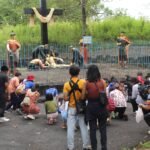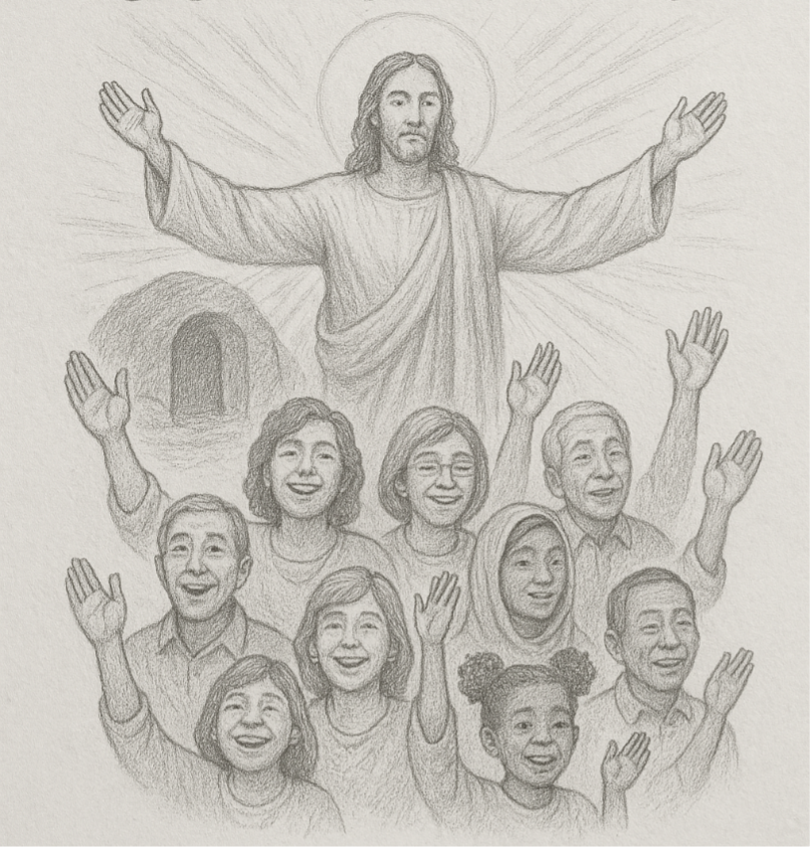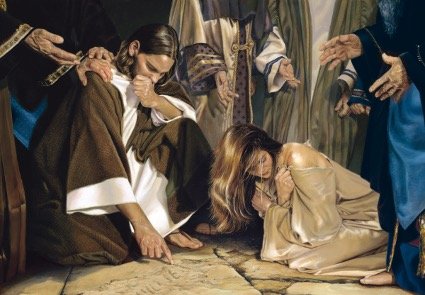
Gospel according to Saint Mark 6,30-34:
The apostles gathered together with Jesus and reported all they had done and taught. He said to them, “Come away by yourselves to a deserted place and rest a while.” People were coming and going in great numbers, and they had no opportunity even to eat. So they went off in the boat by themselves to a deserted place. People saw them leaving and many came to know about it. They hastened there on foot from all the towns and arrived at the place before them. When he disembarked and saw the vast crowd, his heart was moved with pity for them, for they were like sheep without a shepherd; and he began to teach them many things.
Modern Times (…or not so much)
Luis CASASUS President of the Idente Missionaries
Rome, July 21, 2024 | XVI Sunday in Ordinary Time
Jer 23: 1-6; Eph 2: 13-18; Mk 6: 30-34
Lovers of classic cinema will surely remember a scene from Modern Times (1936), where Charles Chaplin begins to behave like just another machine in a factory assembly line. That brilliant actor not only made a parody of a time of economic hardship, but also reflected the dehumanization that societies impose on people, almost always with origin in the ambition for power, as was happening at the time Jeremiah wrote today’s text. Of course there are other factors that accentuate this dehumanization; technology is often cited, although this is nothing new, it has just acquired different characteristics.
Sigmund Freud even saw problems with trains and telephones. In his 1930 book, Civilization and Its Discontents, he wrote: If there had been no railroad to overcome distances, my son would never have left his hometown and I would not need a telephone to hear his voice.
But, in today’s Gospel, we already see how it was the activity, the demands of the people who came to Jesus and his disciples, which prevented them from resting, even eating, despite twice looking for a solitary place.
Thus, in the Gospel text, two frequent difficulties are presented today: being interrupted and overwork. Both can overwhelm us, because of the intensity with which they happen, the rhythm they impose on us and the surprise they can produce. Let us not forget that the Master did not simply seek to rest with the Twelve, for he usually withdrew with them and then, alone, explained everything to them (Mk. 6:34). This was an important moment for transmitting to the first apostles the meaning of their mission. For example, he made them understand why they had not been able to expel a particularly harmful demon (Mk 9:28). In fact, at the beginning of the Gospel text we are told that they were conversing about their recent preaching experiences.
We are all interrupted… and we all interrupt at some time, more or less consciously. We probably see ourselves reflected in one of these three ways of interrupting someone who wants to share something he considers important.
For example, a friend confides his concern: Our son has had an operation on his knee. We are desperate, we are afraid that he will not walk again, because it is a very difficult case and…
- Interruption of the narcissist, who talks about another subject, about his own concerns, changing the conversation: Well, I, for two weeks now, have had an itchy arm that is very unpleasant.
- Interruption of the person with empathy, but with a vanity tendency, of the know-it-all: Yes; the knee is always complicated. My cousin had a motorcycle accident and that was a complex case, because he had a fractured kneecap, dislocation of the tibia, torn ligaments and quadriceps; so the best treatment is usually….
- Interruption of the impatient person, who is not able to listen and believes to “read the mind” of the speaker: Forgive me for interrupting, but I can already imagine the situation; you look distressed and I am sure your wife is discouraged about this and that you have looked at the best doctors; probably your son is depressed and his little brother scared….
There is no lack of painful cases of those who have an authority and interrupt those who ask for forgiveness, saying that they “do not accept” what they consider a mere justification; or they abruptly intervene in a conversation, trying to impose their vision on some matter on which they have no authority or special competence. This attitude is reminiscent of what, in the First Reading, Yahweh manifests to Jeremiah: To the shepherds who shepherd my people: You have scattered my sheep, you have driven them away, you have not kept them; for I will take account of you for the wickedness of your deeds.
Christ gives us a clear lesson of what to do when interrupted. First of all, look at the heart of the person who interrupts. That explains why Jesus felt compassion for them, for they were like sheep without a shepherd. Just like when children interrupt His speech, when a woman comes to Him shouting, when He was sleeping in the boat, when they lowered a paralytic from the terrace while He was speaking to the people… Jesus always looks at the deepest motive that leads people to take the floor hastily; sometimes without being aware that it is not the most opportune thing to do.
—ooOoo—
In reality, the scene in today’s Gospel is not something extraordinary. Rather, it represents the reality of our life if it is truly consecrated to God: It must be a coming and going between heaven and earth. In fact, our Father Founder, Fernando Rielo, expresses it in a way that illustrates the permanent reality of divine action with the cooperation of man: The two actions, contemplative and apostolic, enter into synthesis with a third action: mystical union (25 DEC 1968). St. Ignatius already exhorted his spiritual children to be “contemplatives in action”, a formula that has become famous in recent times.
A story is told of two men who were betting on who would cut more wood than the other. One rested while sharpening his axe, while the other chopped wood without stopping. At the end of the day, the one who rested cut more wood than the other, for his tool was in the best condition.
Of course, we have abundant examples of the saints:
The one who was John Paul II’s personal secretary tells of something that happened after the Pope’s election. It is particularly relevant, as we all remember St. John Paul II as a tireless traveler and man of action. An official arrived at the Vatican asking to speak immediately with the new Pope. The secretary went to the Pope’s room. He was not there. He went to the library, the chapel, the kitchen, even to the roof. Not finding the pope, he went to a Polish priest who knew him well: I have looked everywhere and I cannot find him. The Polish priest calmly asked: Have you looked in the chapel? Yes, said the secretary, He was nowhere in sight. The Polish priest replied: Go further in, but do not turn on the light. The secretary quietly entered the dark chapel. In front of the tabernacle, prostrate on the floor, was the Pope. The Polish priest knew that, before his election, the Pope often prostrated himself before Jesus really present in the Blessed Sacrament.
Undoubtedly, that continuous gaze on Christ (and this is not just beautiful words) is the only solution that the saints and those aspiring to holiness have found to overcome the burden of activities that we often cannot complete, or the lack of time to reflect on a problem, or the impression of not having the right people at our side. Christ did not stop witnessing, even though most people ignored him, including the rich young man. He did not expel any of the disciples “for lack of efficiency” or for having different opinions from his own.
—ooOoo—
The diagnosis made in the Gospel, saying that Jesus saw the people as sheep without a shepherd, is highly realistic and accurate. Not only the healthy, but the sick; not only the ignorant, but those who have had the opportunity to be trained; not only people of difficult character, but the kind, we all have difficulty in orienting our life, to give it direction and meaning.
This is exactly what happens to many people who retire from a job they found exciting and rewarding, finding it difficult to live a full life, despite having a welcoming family and environment. Or especially many young people, who have not had the witness of a person who serves as a role model to guide and channel their energy and talents.
The psychologist Carl Jung already said that we cannot live the evening of life according to the program of the dawn, because what was true in the morning will become a lie in the afternoon.
Like a sheep without a shepherd, the human being cannot easily find his way.
But neither can he persevere on the path he has chosen without the necessary nourishment and protection. Our mind is not satisfied, our heart finds no rest in the face of adversity and at many times it becomes too difficult to make decisions at a crossroads… Temptation and discouragement continually beset us. And, of course, we are capable of betraying our best choices and possibilities, as Esau did (Gen 25: 32-34) by exchanging his future and his firstborn rights for a simple plate of lentils.
An example of our clumsiness to follow the right path, to live a full life, is our capacity for division and individualism. The Second Reading speaks of “the two peoples”, referring to the Jews and all the others, the Gentiles, who had no right to enter the Temple, on pain of death. They were “the foreigners”, as opposed to “the elect”. But this is not just a problem between peoples, cultures or races, but between brothers, between those who share life most intimately. Division is most often the situation between spouses who once loved each other, between parents and children, between members of religious communities who are supposed to share the same ideal. This reality cannot lead us to skepticism or pessimism, because thanks to Christ and only through him, we can approach the Father with one and the same Spirit, as St. Paul concludes today.
Some of us may seek refuge in a spiritual life that only takes into account a supposed intimacy with God. But it is imaginary, not real, for if that intimacy is authentic, it necessarily leads to feeding one’s neighbor. The authentic shepherd knows and feels when the sheep are thirsty and hungry.
Not only that; the true shepherd is also capable of keeping them together, that is, translated into the language of human beings, of building and promoting peace among all. This is something that Christ did by his example, for in situations of conflict and anxiety, the most elaborate reasons and arguments are of little use in transmitting peace to those who do not have it. This is possible when we allow ourselves to be carried away by mercy, which we could say, with our Father Founder, is the content of perfection, as Jesus explicitly indicates: Be merciful as your heavenly Father is merciful (Lk 6: 36).
We do not always know how to appreciate what true compassion, true mercy, means. If I may use a metaphor, it resembles that flower called the dandelion, which looks fragile and delicate. Children use it to amuse themselves by making its seeds fly by blowing on them, but it is very difficult to eradicate!
Such is mercy, which may seem from afar to be a soft and fragile attitude. But, the reality is that it takes much more strength to acknowledge another person’s pain and lean toward them than it does to look the other way or talk about necessary discipline and proper justice. It takes even more courage to try to understand their difficulties and to commit oneself to having the same gestures toward that human being that Christ would have had toward them.
Undoubtedly, it is because mercy is rooted in our nature, even if hatred, indifference or revenge seem to be stronger. God dwells in us and pushes us, unstoppably, to be like Him. The time to recognize his sure victory… is up to us.
_______________________________
In the Sacred Hearts of Jesus, Mary and Joseph,
Luis CASASUS
President













